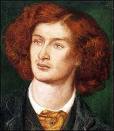Algernon Charles Swinburne (1837-1909)
June 18, 2009
 ** Algernon
Charles
Swinburne[ **(1837-1909)](http://en.wikipedia.org/wiki/Algernon_Charles_Swinburne) was
an English poet.
** Algernon
Charles
Swinburne[ **(1837-1909)](http://en.wikipedia.org/wiki/Algernon_Charles_Swinburne) was
an English poet.
Swinburne was surrounded by homeopathic supporters, including his friends Edmund William Gosse, Henri Rene Albert Guy de Maupassant, George Meredith, Dante Gabriel Rossetti, William Bell Scott, William Sharp, Robert Louis Balfour Stevenson, Walt Whitman, and James John Garth Wilkinson (Algernon Charles Swinburne, Edward Gosse, Thomas James Wise (Eds.), The Complete Works of Algernon Charles Swinburne: Letters, (W. Heinemann Ltd, 1917). Page 60. See also Algernon Charles Swinburne, Edward Gosse, Thomas James Wise (Eds.), The Letters of Algernon Charles Swinburne, Volume 1, (Lane, 1919). Page 291. See also Algernon Charles Swinburne, Cecil Y. Lang (Ed.), Swinburne Letters, 1854-1869, Volume 1, (Yale University Press, 1 Jun 1959). Page 294. See also Algernon Charles Swinburne, Cecil Y. Lang (Ed.), Letters: 1869-1875, (Yale University Press, 1959). Page 286. *‘… Garth Wilkinson (whom I knew very well some years since) will prove able and ready to supply the poems wanted…’ *),
Algernon Swinburne’s publisher Smith, Elder & Co. also published Charlotte Bronte, Robert Browning, George Eliot, Elizabeth Cleghorn Gaskell, Thomas Hardy, Richard Jefferies, George MacDonald, Charles Reade, John Ruskin, Alfred Lord Tennyson and George Gissing.
Swinburne was born at 7 Chester Street, Grosvenor Place, London, on 5 April 1837. He was the eldest of six children born to Captain (later Admiral) Charles Henry Swinburne and Lady Jane Henrietta, daughter of the 3rd Earl of Ashburnham.
He grew up at East Dene in Bonchurch on the Isle of Wight and attended Eton college 1849-53, where he first started writing poetry, and then Balliol College, Oxford 1856-60 with a brief hiatus when he was rusticated from the university in 1859, returning in May 1860.
He spent summer holidays at Capheaton Hall in Northumberland, the house of his grandfather, Sir John Swinburne (1762-1860) who had a famous library and was President of the Literary and Philosophical Society in Newcastle upon Tyne. Swinburne considered Northumberland to be his native county, an emotion memorably reflected in poems like the intensely patriotic ‘Northumberland’, ‘Grace Darling’ and others.
He enjoyed riding his pony across the moors (he was a daring horseman) ‘through honeyed leagues of the northland border’. He never called it the Scottish border.
In the years 1857-60, Swinburne became one of Lady Pauline Trevelyan’s intellectual circle at Wallington Hall and after his grandfather’s death in 1860, would stay with William Bell Scott in Newcastle. In December 1862, Swinburne accompanied William Bell Scott and his guests, probably including Dante Gabriel Rossetti, on a trip to Tynemouth.
William Bell Scott writes in his memoirs that as they walked by the sea, Swinburne declaimed the as yet unpublished Hymn to Proserpine and Laus Veneris in his strange intonation, while the waves ‘were running the whole length of the long level sands towards Cullercoats and sounding like far off acclamations’.
At university Swinburne associated with the Pre-Raphaelites and counted among his best friends Dante Gabriel Rossetti. After leaving college he lived in London and started an active writing career, where Dante Gabriel Rossetti was delighted with his ‘little Northumbrian friend’.
His poetic works include: Atalanta in Calydon (1865), Poems and Ballads I (1866), Songs before Sunrise (1871), Poems and Ballads II, (1878) Tristram of Lyonesse (1882), Poems and Ballads III (1889), and the novel Lesbia Brandon (published posthumously).
Poems and Ballads I caused a sensation when it was first published, especially the poems written in homage of Sappho of Lesbos such as Anactoria and Sapphics. Other poems in this volume such as The Leper, Laus Veneris, and St Dorothy evoke a Victorian fascination with the Middle Ages, and are explicitly medieval in style, tone and construction.
Also featured in this volume are Hymn to Proserpine, The Triumph of Time and Dolores (Notre-Dame des Sept Douleurs).
Swinburne devised the poetic form Roundel, a variation of the French Rondeau form, and some were included in A Century of Roundels dedicated to Christina Rossetti.
Swinburne wrote to Edward Burne Jones in 1883: “I have got a tiny new book of songs or songlets, in one form and all manner of metres … just coming out, of which Miss Rossetti has accepted the dedication. I hope you and Georgie [his wife Georgiana, one of the MacDonald sisters] will find something to like among a hundred poems of nine lines each, twenty four of which are about babies or small children”.
Opinions of these poems vary between those who find them captivating and brilliant, to those who find them merely clever and contrived. One of them, A Baby’s Death, was set to music by the English composer Edward William Elgar as the song Roundel: The little eyes that never knew Light.
Swinburne was an alcoholic and algolagniac, and a highly excitable character. His health suffered as a result, and in 1879 at the age of 42 he had a mental and physical breakdown and was taken into care by his friend Theodore Watts, who looked after him for the rest of his life at No. 2 The Pines, Putney.
Thereafter he lost his youthful rebelliousness and developed into a figure of social respectability. He died in South West London, on 10 April 1909 at the age of 72 and was buried at St. Boniface Church, Bonchurch on the Isle of Wight.